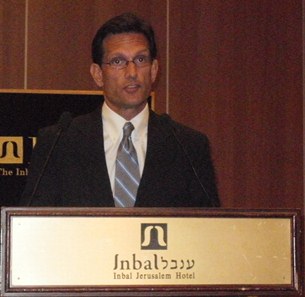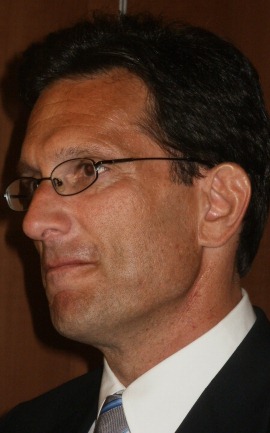 Jerusalem, August 24 – Republican House Majority Leader Eric Cantor from Virginia expressed his marked dissatisfaction with the failure of the Palestinian Authority to condemn the series of deadly terror attacks near Eilat of Aug. 18 committed against Israel last week.
Jerusalem, August 24 – Republican House Majority Leader Eric Cantor from Virginia expressed his marked dissatisfaction with the failure of the Palestinian Authority to condemn the series of deadly terror attacks near Eilat of Aug. 18 committed against Israel last week.
Cantor, who is in Israel leading one of the trips organized by the American Israel Public Affairs Committee with 27 members of the U.S. Congress said at a press conference yesterday at the Inbal Hotel in Jerusalem that the PA’s silence regarding the terror attacks of last week “speaks volumes.”
Cantor also condemned the remarks made by jailed Fatah leader Marwan Barghouti this week that a US veto of a Palestinian bid to join the UN would be tantamount to “terrorism,” and “agression.”
Cantor emphatically rejected any comparison whatsoever between “a vote such as that [a veto] to the attacks committed against Israel last week.” He said that Barghouti’s unacceptable language showed a fundamental misunderstanding of the “value of life” for which the United States stands, and his rhetoric expressed part of the problem in the Middle East.
Cantor was asked if he had considered a revision of US Aid to PA education and to UNRWA [United Nations Releif and Works Agency] in light of the formal joint curriculum adopted by the PA and Hamas and the Hamas takeover of the UNRWA teacher unions. Although US AID funds the building of schools in the PA, US AID does not monitor the content of the curriculum.
 Cantor responded that the US is very concerned by the “hatred and vile” perpetuated by the curriculum in Palestinian schools and that he didn’t think most US taxpayers want their money spent on that. He indicated that the US ought not to fund such hate education.
Cantor responded that the US is very concerned by the “hatred and vile” perpetuated by the curriculum in Palestinian schools and that he didn’t think most US taxpayers want their money spent on that. He indicated that the US ought not to fund such hate education.
Cantor said that the American Congress in a bipartisan resolution has made it clear to the Palestinians that it is unwilling to fund the PA “if its partnership with Hamas is solidified” or “if the PA takes any unilateral action at the UN” for a declaratrion of statehood that is outside the framework of bilateral negotiations with Israel.
He warned “I don’t think a majority of US taxpayers would support an entity [the PA] that would do that.”
When asked to respond to the notion that denying aid to the PA could lead to chaos and the end of the PA itself such that it would not be recommended, Cantor insisted that “actions have consequences” and reiterated that the US House of Representatives does not support taxpayer aid to the PA under these circumstances.
Cantor indicated that even if the US State Department did not want to cut aid to the PA if it took unilateral action at the UN, “You know the way it works. Congress has the power of the purse.” He indicated that there was a sum of 50 million that “has been brought into question” in the current budget in terms of continuing aid to the PA as well as an “upcoming request” for the next fiscal year.
Cantor added that he hoped that there will be a time when the Palestinians are ready to see Israel as “a Jewish state.”
Regarding Egypt, Cantor said that the message for Egypt was that continued US aid to that country “unequivically comes down to whether they will continue as a signatory to the peace treaty with Israel.”
When asked by CNN about how much the trips to Israel that 81 Republican and Democrat lawmakers [almost 20 percent of the House of Representatives] are taking this month will cost the US taxpayers at at time when the US is facing serious domestic issues, Cantor clarified that these trips were not costing the US taxpayer anything as they were “privately funded” by the American Israel Educational Alliance.
He said that the number of members of Congress who come to Israel is reflective of the fact that Israel continues to be a pillar in the US’s national security strategy, the only reliable democratic ally that the US has and that lawmakers are better able to understand the complexities of the conflict by seeing things first hand and meeting both Israeli and Palestinian officials.
During the trip, Cantor said his delegation met separately with Prime Minister Binyamin Netanyahu in Jerusalem and Palestinian Authority President Mahmoud Abbas and Palestinian Prime Minister Salam Fayyad in Ramallah. Cantor said the delegation maded it clear to Abbas and Fayyad that “We do not support or condone the effort by the Palestinian Authority to seek recognition of a state unilaterally, and we support security.”









